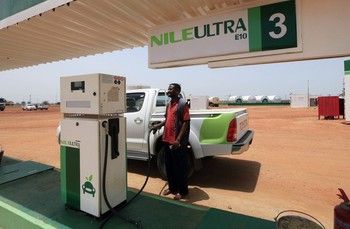Sudan poised to lift fuel subsidies next week amid warnings about its impact
September 12, 2013 (KHARTOUM) – The Sudanese ministry of finance and national economy formally announced its intention to lift fuel subsidies in the coming days after receiving clearance from the government, saying it will be implemented in conjunction an increase in the minimum wage.

But many observers dismiss the planned hike in wages saying it will be too small to make a dent in the costs of living for most Sudanese households.
The cabinet is scheduled to meet next Thursday to endorse the new minimum wage, the finance minister Ali Mahmood Abdel-Rasool said.
He pledged to make funds available to execute the wage increase which are expected to come from the savings arising from lifting fuel subsidies.
Abdel-Rasool had previously argued that the government sells oil for $49 a barrel while buying it for at least $100 stressing that a big chunk of the subsidies goes to undeserving people necessitating restructuring of the system.
The Sudanese minister along with other officials have briefed other parties including opposition on their plan to lift the subsidies.
Both the National Umma Party (NUP) and the Democratic Unionist Party (DUP) have rejected removing the subsidies and emphasised the adverse impact it will have on the livelihoods of ordinary citizens.
The minister of state at the ministry of finance, Majdi Hassan Yassin, said on Thursday that they plan to gradually lift the fuel subsidies and that the government will renew focus on alternative sources of revenue including wheat, Gum Arabic and livestock to boost its production.
The investment minister, Mustafa Osman Ismail, defended the government’s decision saying that if the ruling National Congress Party (NCP) was looking for political expediency they would not have resorted to this measure ahead of the 2015 elections.
“We know that the decision will have political repercussions but we have decided to move forward because backing off will result in economic consequences that are more dangerous than political ones,” Ismail was quoted by Sudan news agency (SUNA).
“If we wanted to handle this politically we would because elections are coming….We can reach an understanding with the street about the decision which we were studying for two years,” Ismail added.
The minister mentioned that during the last two years the smuggling of subsidised goods have continued unabated and particularly fuel.
The World Bank and the International Monetary Fund (IMF) have urged Sudan to free up its budget by lifting subsidies and instead focus on expanding the social safety net.
Sudan lost three-quarters of its oil production when South Sudan became independent in July 2011, worsening an already existing economic crisis as oil was the government’s main source of revenue, providing the hard currency needed to import food and other basic items.
Last year, the government launched a package of tough austerity measures, including scaling back fuel and sugar subsidies sparking rare but short-lived protests.
Khartoum also moved to effectively devalue the currency which came under enormous pressures as a result of a big shortage in Forex inflows. The Sudanese pound has lost more than half of its value since the country’s breakup, which is blamed for putting inflation at double digits for several years.
Sudan is also labouring under a level of external debts that have well surpassed $40 billion.
The World Economic Outlook (WEO) released last April by the IMF showed Sudan’s economy shrinking by -4.4% in 2012.
In 2013, Sudan is expected to achieve a 1.2% growth which is higher than the -0.6% projected by the IMF last year. Next year’s GDP is also forecasted to stand at 2.6% which is slightly better than the 2.1% predicted in the IMF’s last assessment of Sudan’s economy.
(ST)
